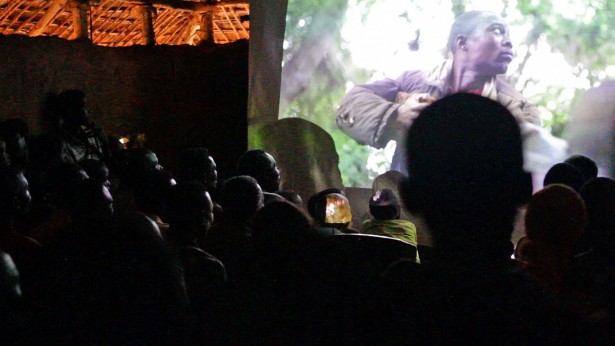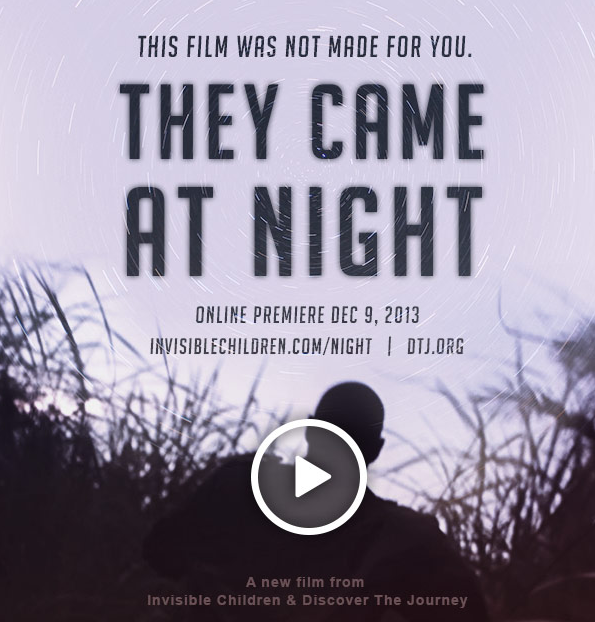Invisible Children partnered with Discover The Journey (DTJ) to make a film with communities affected by the LRA, for communities affected by the LRA. They Came at Night shows two perspectives: those escaping the LRA, and those welcoming them back into the community. The goal is to show communities in LRA-affected regions that defection, reintegration, and forgiveness are the most promising way to peacefully end the war. This film is distributed via Mobile Cinema – media shown using a projector and a large inflatable screen in communities across remote central Africa.
The following was written by Lindsay Branham, the Program Director for DTJ:
I was mid-interview with 17 year-old Francois who had been a child soldier for most of his teenage years in the eastern region of the Democratic Republic of Congo (DRC). This boy had been forced to fight, witnessed violence and walked among the dead. By day, he said, he was haunted by memories of life on the frontlines. And even though he was finally home, he said he faced exclusion and rejection from his community. He said he felt like a foreigner in his own home, a stranger among family, and a separateness that he could not figure out how to transcend. He then paused, his eyes revealing the isolation he described. “But if other children could understand what I had gone through,” Francois said, “they would accept me.”
And as I sat there, camera in hand, I realized I had missed it, and now here it was. Could stigma and rejection dissolve through understanding and identification? Could his own story be the tool that would build a bridge back into the family he longed for? Francois’s question became the inciting moment for Mobile Cinema.
I went on to northeastern DRC where Kony’s Lord’s Resistance Army (LRA) had left an indelible mark of violence and pain across an enormous geographical region, and where children just like Francois hoped for acceptance once they came back home from abduction. Right now, efforts by the international community, including Invisible Children, are underway to influence current LRA combatants to decide to peacefully surrender, or defect. These defection activities are non-violent strategies to end the war by reducing the LRA’s numbers and draining them of their strength. In 2013, 79% of the 58 documented LRA escapees cited current defection projects as influential in their decision to leave the LRA. However, what happens when LRA combatants escape? Are local communities prepared to face the very people who may have committed violence against them? Is forgiveness possible?
To address this tension, when community members living in current LRA-affected central Africa act as reception centers for LRA escapees, we partnered with Invisible Children to do something that hadn’t been done before: we made a film with communities affected by the LRA, for communities affected by the LRA. We wanted to help them tell their own story to each other.
They Came at Night is a narrative fictional film that tells the story of an abducted LRA child soldier, how he risks his life to escape, and how a nearby community puts their own pain aside to help him come home.
At DTJ, we believe that stories are a universal language, and that they can transcend borders and boundaries. We have seen proof of this with our first Mobile Cinema program that we implemented in 2012-2013 in over 14 communities in northeastern DRC that has resulted in statistically significant drops in psychological distress and trauma symptoms among participants. And formerly abducted children report being accepted more by their peers and communities. They said they finally felt understood.
Building off of this evidence-based approach to reducing stigma, we created and released They Came at Night to audiences in central Africa this fall, the primary audience the film was created for.

But we thought we would transcend borders again and invite a western audience to see it too. This 20-minute film is an invitation: to communities in central Africa and communities in the U.S. and beyond to understand that LRA combatants are victims themselves, that surrender and forgiveness is necessary to ending the war, and that we all have a role to play.
Before we shot even one frame of the film, we conducted extensive qualitative research to understand what communities were going through, how they perceived the LRA and what their own definitions of forgiveness were. The findings of this research can be read in our newest report, Come out and live among us.
To create They Came at Night, we worked hand-in-hand with our local partner, Dungu-based Solidarity and Integral Assistance to Destitute People (SAIPED). We recognize the limitations of our perspective and became instruments to help them tell their own story. They were core members of our team and we co-created the storyline together, translated it into the local language, Zande, and launched into production. We cast first-time actors personally affected by the war and shot the film in northeastern DRC.
Right now, the film is being toured in central Africa in Mobile Cinema screenings with workshops facilitated by local partners including SAIPED. By the end of 2013, over 2,742 people will have seen this new film on blow-up screens run by generators in communities across remote central Africa. All 2,742 people will have also gone through the workshop, which includes guided discussions, role-play, games, and exercises to unpack the themes and characters in the film.
The communities chosen for the screenings and workshops have been deemed Safe Reporting Sites where the LRA can safely surrender. DTJ and Invisible Children have set up Community Defection Committees (CDCs) in each of these Safe Reporting Sites which are comprised of a group of local leaders responsible for acting as a hub of information: they report on LRA movements and provide information back through their communities. The workshop and CDCs exist to ensure people are prepared when an LRA combatant escapes and ends up in their community; from how to recognize an LRA combatant who is surrendering to what to do in response, we are committed to making sure the LRA will be peacefully received and that communities will be safe in the process.
All of these program activities serve as tools to create a safe space for people to explore acceptance and forgiveness. And so far, we have seen incredible results.
Before watching They Came at Night, one participant said that he could never forgive an LRA fighter who escapes because the LRA had killed all of his family and he said he wanted revenge. But after watching the film and going through the program, this same participant said, “Now I can forgive an LRA soldier who escapes.” He then continued, “so that I can have peace.”
Ernest Sugule, the founder of SAIPED, just completed screening the new film in Djabir, DRC and said, “All the participants have been able to move away from bitterness and a sentiment of vengeance to forgiveness.”
I now believe that telling your story is not just important, it is potent: it can be an agent of healing that can even transcend a history of violence. I am watching it happen in central Africa where people are bravely deciding to forgive instead of foster bitterness, to accept instead of reject, because peace is impossible unless they do.

Think people should hear about this?